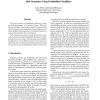122
click to vote
RTS
2010
15 years 16 days ago
2010
The current practice to design software for real-time systems is tedious. There is almost no tool support that assists the designer in automatically deriving safe bounds of the wor...
107
click to vote
JSA
1998
15 years 1 months ago
1998
In this paper, we present a network conscious approach to designing distributed real-time systems. Given a task graph design of the system, the end-to-end constraints on the input...
136
click to vote
JSS
2007
15 years 2 months ago
2007
The resource management in distributed real-time systems becomes increasingly unpredictable with the proliferation of data-driven applications. Therefore, it is inefficient to all...
100
click to vote
WISES
2004
15 years 3 months ago
2004
-- A main prerequisite for the successful development of real-time systems is the capability for debugging and monitoring of these systems. The debugging of real-time systems is mo...
127
Voted
ICALP
1992
Springer
15 years 6 months ago
1992
Springer
Real-time systems operate in \real," continuous time and state changes may occur at any real-numbered time point. Yet many veri cation methods are based on the assumption that...
161
click to vote
CONCUR
1998
Springer
15 years 6 months ago
1998
Springer
Performance evaluation is a central issue in the design of complex real-time systems. In this work, we propose an extension of socalled "Max-Plus" algebraic techniques to...
107
click to vote
IPPS
1998
IEEE
15 years 6 months ago
1998
IEEE
Traditional reliability measures for computer systems can be classi ed into Computer-Centric or Application-Centric categories. The former concentrate on the hardware resources whi...
142
click to vote
ECRTS
1999
IEEE
15 years 6 months ago
1999
IEEE
This paper presents a probabilistic approach to guarantee the performance of a real-time system. While traditional real-time system analysis tends to guarantee that each task inst...
156
click to vote
EUROMICRO
2002
IEEE
15 years 7 months ago
2002
IEEE
In this paper we propose a method for predicting the consequences of adding new components to an existing product line in the real-time systems domain. We refer to such a predicti...
120
click to vote
IWSOC
2003
IEEE
15 years 7 months ago
2003
IEEE
The new technology of reconfigurable System-on-Chip is shown to be a good match to the requirements of realtime embedded systems. In particular, the judicious use of specialised d...



